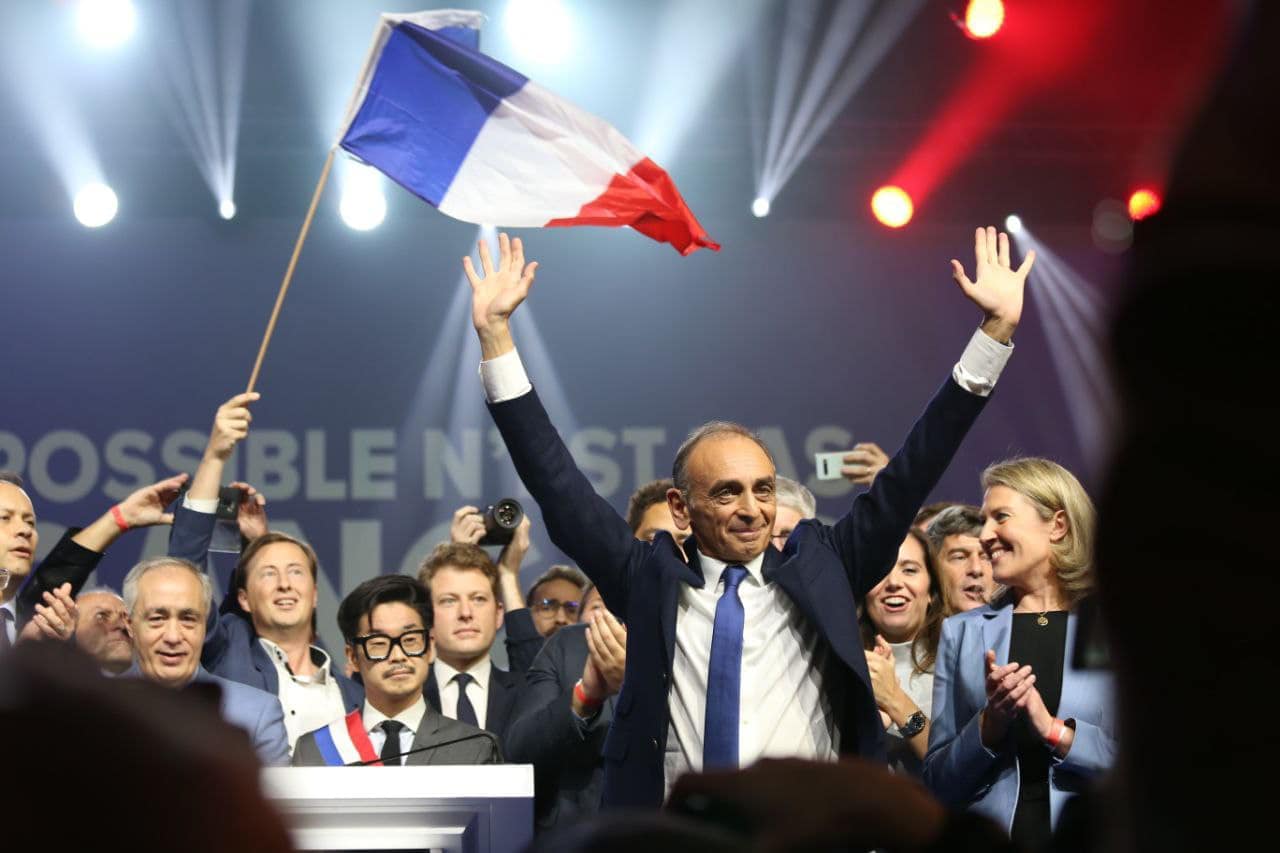
Éric Zemmour seems to have won the bet: for his first campaign rally on Sunday, December 4, the Villepinte exhibition center welcomed nearly 15,000 people who came to support the journalist-turned-politician.
If the declaration of candidacy on Tuesday, November 30th surprised and puzzled people—in negative and positive ways, including among Zemmour’s own supporters—the echoes of the Villepinte rally are unanimous: the French press, and others, called the performance a success, despite the inevitable ideological differences.
'This rally was a success that people were happy, and he was excellent'
— GB News (@GBNEWS) December 7, 2021
French journalist and columnist Anne-Elisabeth Moutet comments on the first major campaign rally held by by the far-right French presidential candidate Eric Zemmour. pic.twitter.com/T0vhNQkomi
The atmosphere of the congress was marked by great agitation. Antifa activists had increased the pressure in the previous days by announcing that they wanted to prevent the rally from taking place. Their threats were the reason for moving the event from Paris to Villepinte, in the Seine-Saint-Denis department, which has a very large immigrant population. Local elected officials had also expressed their disagreement with the arrival of the polemicist. Activists from the association SOS Racisme, which frequently opposes Zemmour, carried out an action in the congress hall itself. The journalists of the talk show Quotidien, generally very critical of Zemmour, were exfiltrated by security guards to guarantee their safety. Zemmour’s opponents criticize his ability to generate violence and chaos, but it is important to remember that the climate of violence had been carefully nurtured by far-left militants for several days leading up to the event. Candidate Zemmour himself was assaulted and injured when he arrived at the podium, resulting in an estimated 9-day temporary work disability.
Éric Zemmour unveiled the name of his party on Sunday: Reconquête (Reconquest). Several hypotheses had been circulating, such as Vox Populi and Resistance. In the end he chose a word reflecting a dynamic movement, and of course an obvious historical reference—the Reconquista, which allowed the liberation of Spain from the Muslim presence in the 15th century. His slogan “Impossible is not French” is borrowed from Napoleon.
One of Zemmour’s challenges for this event was not to appear as a solitary character. His teams therefore enlisted the support of well-known political figures from the French right. The president of the Conservative Movement Laurence Trochu, who rallied for Zemmour after Valérie Pécresse’s victory, and the president of the Via – La voie du peuple party, formerly the Christian Democratic Party, Jean-Frédéric Poisson, both made speeches. Christine Boutin who is one of the major figures of the pro-life and pro-family movement in France was there too. Éric Zemmour also received the support of Joachim Son-Forget, an unclassifiable deputy initially member of La République En Marche.
Éric Zemmour’s speech was true to his character —a speech on French civilization rather than a technocratic speech or a catalog of measures. He took up his favorite themes, even if he was more discreet on ‘dangerous’ subjects like the Vichy regime or Muslims. One formula is worth remembering: “give the right to vote to FN [Front national, now Rassemblement national] voters and give the true right to LR [Les Républicains] voters.” Here lies Zemmour’s strategy: to be at the junction of the two parties and to seduce both electorates—hat of the RN party, to get them out of a protest vote that never leads to the exercise of power, and that of the LR party, which he thinks has betrayed the values of the right.
He developed the three major axes of his program: immigration, industrialization, and education. His firm proposals on immigration are well known: abolition of birthright, zero immigration, and assimilation. On industrialization, he explained that he wanted to lower production taxes and reserve public contracts for national companies. Finally, on education, he offered proposals that are very popular among his supporters, namely the end of LGBT and woke ideology in schools and banning inclusive writing.
The choice of Valérie Pécresse by Les Républicains the day before his rally is a serious encouragement for Éric Zemmour, as it leaves a substantial part of the right-wing voters of this party orphaned. Valérie Pécresse does not show any real desire to bring people together, and makes ambiguous remarks about including elements of Éric Ciotti’s programme into her own. In response to Pécresse’s defiance, Ciotti has already founded his own movement, “À Droite !”
Zemmour also distances himself from Pécresse on the thorny issue of the health pass. Pécresse is in favor of mandatory vaccination and potentially supports lockdowns of non-vaccinated people. She also announced that she would not hold any physical rallies to avoid any health risk—despite the fact that the French government does not require a health pass for participation in a political meeting, at least for the moment. Valérie Pécresse’s decision obviously offers a striking contrast with the large crowd gathered on Sunday to support Éric Zemmour. The battle of image is going to be hard between the two.
